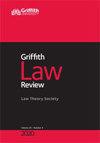Extraction and jurisdiction: forms of law and the Antarctic Treaty System*
IF 0.9
Q1 LAW
引用次数: 0
Abstract
ABSTRACT This article joins a conversation that examines the dynamics of extraction in global space and their relationship to practices of authorisation in international law. The article offers an analysis of a specific historical debate that occurred through the negotiation of the since-abandoned Convention on the Regulation of Antarctica Mineral Resource Activities (CRAMRA). The debate was largely over whether the Antarctic Treaty System (ATS) should continue to govern Antarctica. This article argues that while extracting mineral resources from Antarctica has now been foreclosed, the jurisdictional form that remains is part of the enabling legal infrastructure that patterns contemporary global extraction. Specifically, this jurisdictional form entails the reassertion of international legal authority grounded in colonial territorial claims, and a reappropriation of the Common Heritage of Mankind principle (CHM) to appeal to a construction of universality that repeats the familiar colonial move of locating ‘humanity’ largely in the Global North. In the contested times of the Anthropocene, discussion of the ATS rightly celebrates an instance of restraining corporate extraction of hydrocarbons from an unstable climactic ecosystem. However, we could also take account of how the ATS’ jurisdictional form could contribute to contemporary global extraction and its highly unequal consequences.提取和管辖权:法律形式和南极条约系统*
本文加入了一场对话,探讨全球空间中的提取动态及其与国际法授权实践的关系。这篇文章分析了在谈判后来被放弃的《南极洲矿产资源活动管理公约》(CRAMRA)期间发生的一场具体的历史辩论。争论的焦点主要是南极条约体系(ATS)是否应该继续管理南极洲。本文认为,虽然从南极洲开采矿产资源现在已被取消,但仍然存在的司法管辖形式是当代全球开采的有利法律基础设施的一部分。具体来说,这种管辖权形式需要重申基于殖民地领土要求的国际法律权威,并重新利用人类共同遗产原则(CHM),以呼吁一种普遍性的建构,这种建构重复了人们熟悉的将“人类”主要定位在全球北方的殖民运动。在人类世充满争议的时代,对ATS的讨论恰当地颂扬了一个限制企业从不稳定的气候生态系统中开采碳氢化合物的例子。然而,我们也可以考虑ATS的管辖形式如何有助于当代全球开采及其高度不平等的后果。
本文章由计算机程序翻译,如有差异,请以英文原文为准。
求助全文
约1分钟内获得全文
求助全文

 求助内容:
求助内容: 应助结果提醒方式:
应助结果提醒方式:


